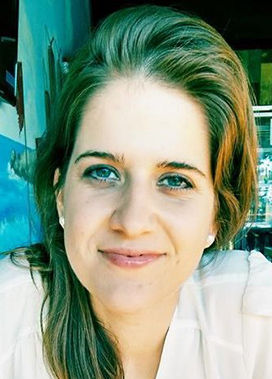Teresa Walch Awarded First Katz Research Fellowship in Genocide Studies

USC Shoah Foundation Center for Advanced Genocide Research’s inaugural Robert J. Katz Research Fellowship in Genocide Studies for 2016-2017 has been awarded to Teresa Walch, Ph.D. candidate in modern European history at UC San Diego.
The Robert J. Katz Research Fellowship in Genocide Studies enables an advanced standing PhD candidate to spend up to a month in residence at the Center every year. This new fellowship is named after long-time volunteer and former Board of Councilors Chair Robert J. Katz in recognition of his service to the Institute. Walch will be in residence at USC Shoah Foundation in early spring 2017.
Walch received a BA in history and German from College of Saint Benedict and her MA in modern European history from UC San Diego. She expects to receive her Ph.D. from UC San Diego in 2018.
She is currently in Germany on a Fulbright scholarship conducting research for her dissertation, titled “Degenerate Spaces: The Coordination of Space in Nazi Germany.”
Walch has encountered Holocaust survivors many times over the years. She gave tours of Dachau concentration camp for a year while volunteering with the German organization Aktion Sühnezeichen Friedensdienste and met many survivors there, as well as at survivor talks in San Diego. She also graded an undergraduate course in which the students were asked to view testimony from the USC Shoah Foundation and incorporate them into their final papers.
“It is through these experiences that I became aware of the significance of testimony – both for the future of teaching Holocaust history in the future and for my own dissertation research as well,” she said.
Walch’s dissertation will explore the exclusion of German Jews from their own homeland during the Holocaust. She discusses how space played a crucial role in the Nazi rise to and consolidation of power, through prisons, concentration camps, and Nazis’ barring of Jews from all public spaces like stores, restaurants, sidewalks and ultimately their own homes.
Walch will also draw from current research on the architectural and spatial aspects of the Holocaust in eastern Europe to demonstrate that similar methods of oppression through spaces were used in Germany proper as well.
“It is crucial to examine Jews’ personal experiences of alienation and isolation in 1930s Europe to help us understand what later transpired in the 1940s, for concentration camps, ghettos, and mass extermination were preceded by the gradual but calculated exclusion of Jews from space in their own homelands,” Walch said.
“I wish to give voice to the individual people whose lives were violently uprooted.”
Although she has found many government and institutional documents that outline how Nazis, governmental officials, policemen, architects, and city planners sought to redesign space to fit their ideological visions and how they systematically excluded racial and political “enemies of state” from public spaces, it has been almost impossible for her to find personal accounts of Jews in Germany in the 1930s and ‘40s that describe how their lives were affected by Nazi policies. This is what Walch will research in the Visual History Archive during her fellowship.
“As a historian, I believe that social history is really important and that we should strive to shed light on and give voice to the people whose lives were directly affected by decisions and policies at “the top,” Walch said. “For me, it is not enough just to view this history from the perpetrator or institutional perspectives, to analyze it through the lens of cold and bureaucratic governmental documents that often view the victims as nameless and faceless millions. Rather, if sources allow it, I wish to give voice to the individual people whose lives were violently uprooted.”